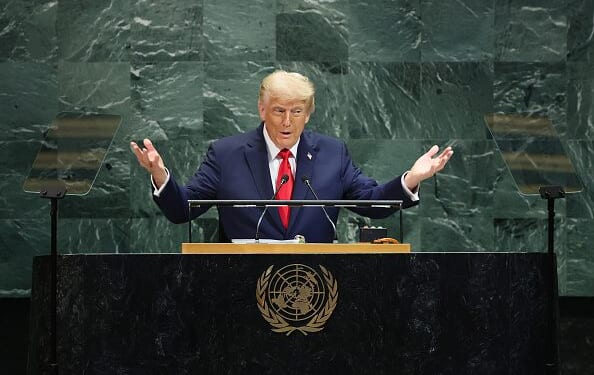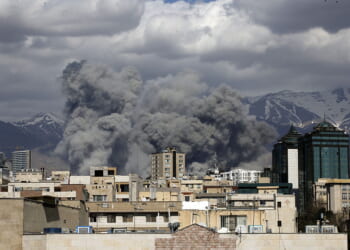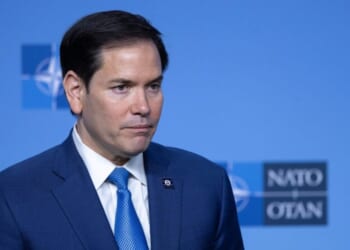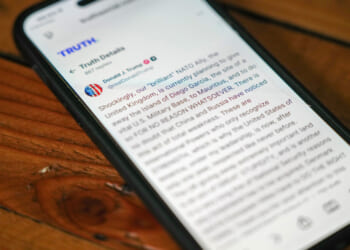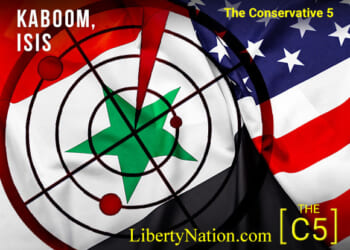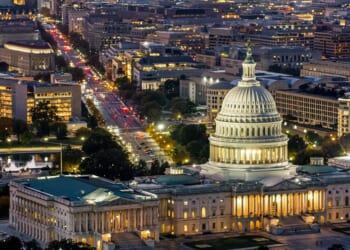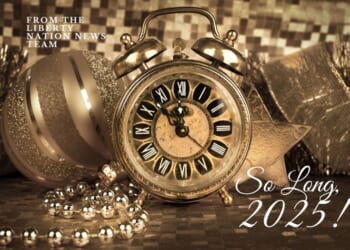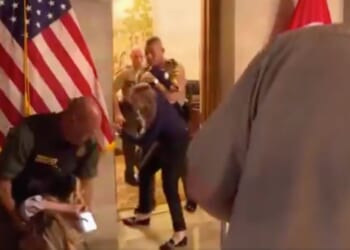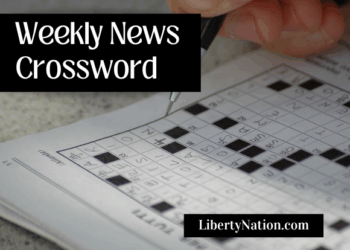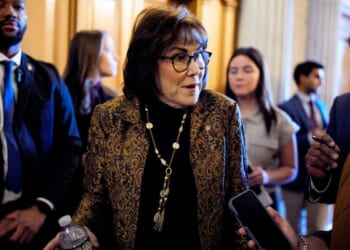Donald Trump was hosting a roundtable on Antifa when Marco Rubio, his Secretary of State, hurried over. As Rubio whispered something into the presidential ear, Trump appeared to be listening intently. Almost immediately, Trump shared the secret with the room. “We’re very close to a deal in the Middle East,” he announced, “and they’ll need me pretty quickly.”
After two years of conflict between Israel and Hamas, and nine months of Trump’s second presidency, the White House seems to be moving with alacrity. At the same time, officials seem to be trying to ensure that Trump gets credit. Rubio had also handed Trump a note instructing the President that he would need to approve a social media post, “so you can announce deal first”.
The instinct to give Trump credit is nothing new. But why the sudden haste? One reason might be the two-year anniversary of the October 7 massacre. But another key landmark looms. Today, the Norwegian Nobel Committee will announce the winners of its annual awards — and the world will know whether or not the Peace Prize has been awarded to the American President.
Trump has not been subtle in his pursuit of the gold medal. In January, in his second inaugural address, Trump predicted that his “proudest legacy will be that of a peacemaker”. Since then, his deputies have often referred to him as “peacemaker-in-chief”, and the White House has been on a diplomatic trolley dash. This summer, while holding a press conference with Prime Minister Keir Starmer, Trump claimed to have “stopped six wars”. “I’m averaging about a war a month,” he quipped. His press secretary, Karoline Leavitt, used the same line, telling the press corps on 31 July that Trump had ended conflicts between Thailand and Cambodia, Israel and Iran, Rwanda and the Democratic Republic of the Congo, India and Pakistan, Serbia and Kosovo, and Egypt and Ethiopia. “This means President Trump has brokered on average about one peace deal or ceasefire per month during his six months in office,” said Leavitt. To drive the point home, she added: “It’s well past time that President Trump was awarded the Nobel Peace Prize.”
By the time Trump addressed the UN General Assembly in September, denouncing the globalists in the gilded hall in which they had previously laughed at him, his case had been apparently strengthened: the US had now brokered a deal between Armenia and Azerbaijan. Seven wars down, Trump devoted a portion of his address to the prize and how little he cared about it. “Everyone says that I should get the Nobel Peace Prize,” the President explained, “but for me, the real prize will be the sons and daughters who live to grow up with their mothers and fathers because millions of people are no longer being killed in endless and un-glorious wars. What I care about is not winning prizes, it’s saving lives.”
It would be forgivable to think that Trump’s words recalled Shakespeare’s line “the lady doth protest too much”. The White House’s concerted campaign is evidence enough; the Nobel prizes are supposed to be awarded for feats achieved in the 12 months prior to the award being given out. Hence the rush. But Trump’s obsession with the prize goes back much further. Before his re-election, he complained that, if he were named Obama, he “would have had the Nobel Prize given to me in 10 seconds”. The original Obama, Trump noted, won the Nobel Prize almost as soon as he had been elected. “He didn’t even know what the hell he got it for.”
It is commonly held that Trump has despised Obama since the latter, then the incumbent president, humiliated the real-estate developer at a White House dinner in 2011. Obama’s easy charisma gave him bien-pensant acclaim and is likely to have smoothed his path to the Peace Prize. Within a year of reaching the White House, Obama joined Martin Luther King, the Dalai Lama, Mikhail Gorbachev and Nelson Mandela in the annals of Nobel peace laureates. How infuriating it must have been for Trump that his nemesis seemed to stroll so effortlessly into that pantheon.
And it is a pantheon that has enough popular attention for Trump to have been eyeing it up for decades prior to Obama’s award. Jay Nordlinger, author of Peace, They Say, a history of the Nobel Peace Prize, told me that, in Trump’s formative years, “being on the cover of Time magazine was a huge, huge deal. If you’re the cover of Time magazine, you were like a national celebrity. And Trump has always liked being on the cover of Time.” Some of the most famous past winners received their prizes in the Eighties and Nineties, when Trump was completing his ascent to the heights of new-money stardom and first suggesting that he might one day run for president. The award would satisfy Trump’s competitive instincts and his desire for acclaim. It represents a further crowning achievement for a man who has already reached the world’s most powerful office twice, and it would be the result of his dealmaking: the keystone of Trump’s self-mythologising. And, given that the award is doled out by European liberals, a Trump victory would feel like a storming of the citadel. It would be as though his greatest enemies were made to place the crown on his head.
“It would be as though his greatest enemies were made to place the crown on his head.”
So how likely is his success? Fact checkers have been somewhat puzzled by Trump’s claims to have ended conflicts in Serbia and Kosovo, and Egypt and Ethiopia, though critics concede that the President has played a key role in nudging many of the relevant parties into peace agreements. Evelyn Farkas of the McCain Institute framed his victories as missions to pick low-hanging fruit. “In the cases where he can get quick results, he’s been successful,” she told FactCheck.org.
And, for what it’s worth, Trump has had support from outside the White House. Pakistan’s government nominated Trump for the prize, making him one of 338 total nominees, as did the prime minister of Cambodia. Pakistan cheered Trump’s “decisive diplomatic intervention” amidst conflict with India this year, and Cambodia’s PM hailed his “extraordinary statesmanship” in helping resolve a border dispute with Thailand. Citing the Abraham Accords, Netanyahu shared his nomination letter to the Nobel committee in June, writing, “Few leaders have achieved such tangible breakthroughs to peace in such a short time. In these times of great historic change, I can think of no one more deserving than President Trump of the Nobel Peace Prize.”
These nominations will go only so far. Tevi Troy, a presidential historian, told me he thinks Trump faces “two hurdles”. “One is that he’s an American president,” said Troy, “and the second is that he’s a Republican.”
“American presidents relatively rarely win the Nobel Peace Prize,” he added, “and a Republican hasn’t done it since Teddy Roosevelt.” Hawkish American executives did not lend themselves naturally to consideration from Scandinavian peaceniks after the Second World War. Further, Troy noted, the two significant conflicts on everyone’s mind — Israel and Hamas and Russia and Ukraine — are not yet clearly resolved. Even on their own, Nordlinger posits, the Abraham Accords would likely not be Trump’s ticket to the prize because of the ongoing “bloodletting” in the conflict.
Nor are the signs from Norway promising. One member of the five-person Nobel committee doused Trump’s hopes in cold water with a little-noticed leak to Reuters. Trump’s “lobbying” for the award, “is likely to be counterproductive”, the reporter Gwladys Fouché wrote in late September. “The award-giving committee prefers to work independently, one of its members told Reuters, sheltering from outside pressures.”
When asked if he could come up with any other historical examples of a candidate campaigning so openly for the prize, Nordlinger said, “I’m afraid I can’t.” “No one’s ever campaigned so openly, so brazenly for the prize as Trump has,” he explained. “Nobody, not even close. And usually it is said that campaigning backfires.” Committee members, Nordlinger says, are elected by the Norwegian legislature and thus “the Nobel Committee reflects Norwegian and, more broadly, Scandinavian political culture, which is social democratic”. Judges evaluate nominees on three points: disarmament measures, efforts to hold peace congresses, and “fraternity between nations” — Nordlinger says this is the most important criterion. Trump’s aggressive address to the UN is unlikely to have been helpful.
One White House staffer told me Team Trump has privately written off the possibility of their boss being rewarded for his efforts. The sense at 1600 Pennsylvania Ave is that Trump could bring about world peace and still get snubbed.
Nordlinger’s view is that Trump’s most recent comments on the matter can be thought of as “putting pressure on the refs. He’s making it so that when they don’t give it to him, he’ll say that he was robbed.”
Trump has overcome steep odds many times in his political life, has three more years in the White House, and can count on allies and supplicants to keep nominating for as long as he remains in power. “He deserves that Nobel Peace Prize, he deserves to be on Mount Rushmore, and I think in time he’ll get both,” said his son, Eric Trump. This might not be Trump’s year, then, but there remain wars to end.
As of Monday, Trump’s odds on Polymarket were a measly 3%. By Thursday, after the Gaza peace announcement, those odds had doubled — to a whopping 6%. “Will Trump get the Nobel Peace Prize?” Nordlinger asks. “Stranger things have happened, but not many.”

